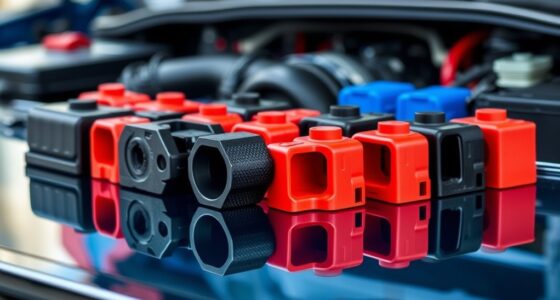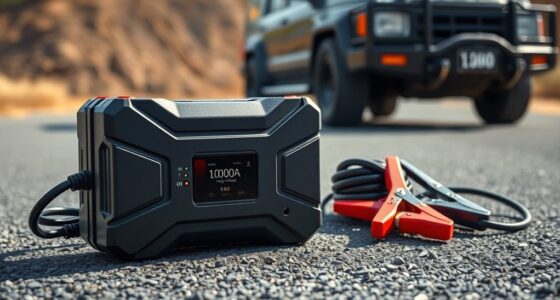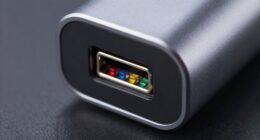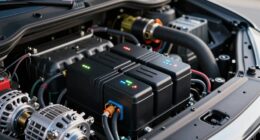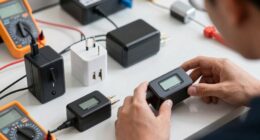If you’re looking to keep your batteries in top shape, I recommend checking out some of the best hydrometers like the EZRED SP101, Watris Veiyi, Mighty Max, and Kingdder models. These tools offer accurate, reliable electrolyte measurements for various battery types, helping you prevent failures and extend lifespan. Each has unique features like quick results, durability, and portability. Stay with me, and I’ll show you how to pick the perfect one for your needs.
Key Takeaways
- Choose hydrometers with high accuracy, clear scales, and temperature compensation for reliable battery health readings.
- Consider models compatible with multiple voltages (6V, 12V, 24V) for versatile maintenance needs.
- Prioritize durable, impact-resistant materials like ABS or glass for longevity in various environments.
- Opt for portable, easy-to-use hydrometers that facilitate quick electrolyte specific gravity checks.
- Invest in reputable brands offering precise, reliable measurements to prevent battery failures and extend lifespan.
EZRED SP101 Battery Hydrometer, Factory
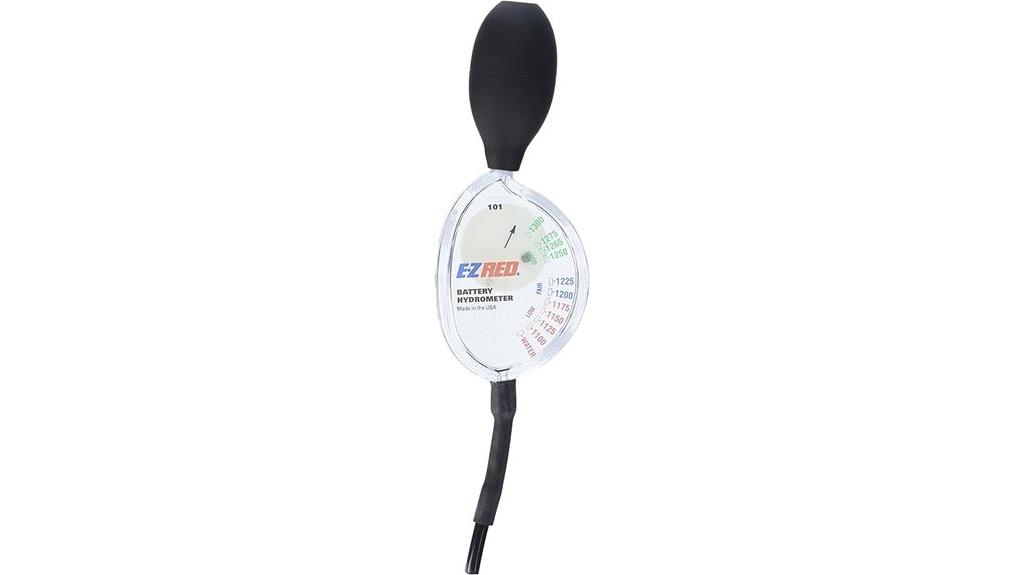
The EZRED SP101 Battery Hydrometer is the perfect choice for service stations, garages, and professional technicians who need reliable, quick readings of battery acid levels. Its rugged construction withstands tough conditions, making it durable and dependable. Using it is straightforward—no float reading complexities or temperature tables required. With a measurement range from 1.100 to 1.300, it delivers precise assessments of a battery’s charge state. Whether you’re working on automotive, electrical, or heating systems, this hydrometer provides accurate results fast. EZRED’s reputation for high-quality, professional-grade tools makes the SP101 an essential instrument for maintaining battery health efficiently.
Best For: professional technicians, service stations, garages, and DIY enthusiasts seeking quick, accurate battery acid level readings.
Pros:
- Rugged construction for durability in tough environments
- Easy to use with straightforward, no-float reading system
- Provides precise measurements within a range of 1.100 to 1.300 for reliable battery assessments
Cons:
- Limited measurement range may not suit all battery types
- Requires manual handling, which may be less convenient for some users
- Does not include additional features like temperature compensation or digital readouts
Watris Veiyi Rapid Battery Hydrometer Tester for 6V, 12V, 24V Golf Cart Systems
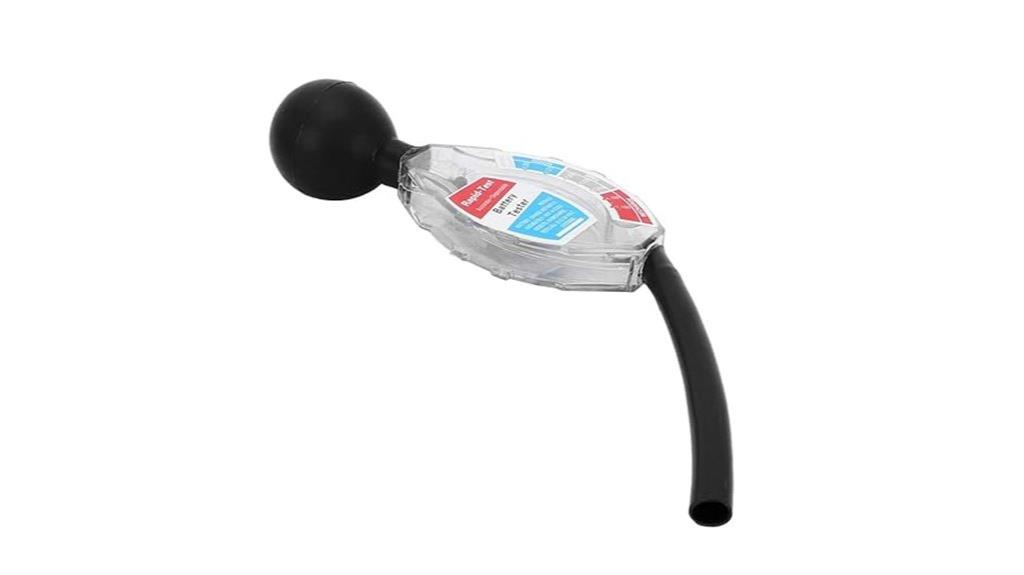
For anyone maintaining golf cart batteries, the Watris Veiyi Rapid Battery Hydrometer Tester stands out as a top choice, especially for systems operating at 6V, 12V, or 24V. This tool provides quick, accurate readings of specific gravity in plumbic acid batteries without heating or needing a thermometer. Its design eliminates float readings, making measurements straightforward and hassle-free. Made from durable ABS plastic, it’s tough, drop-resistant, and suitable for cold temperatures. Plus, with responsive customer support and simple packaging, it’s a reliable option for checking battery health across various voltage systems, ensuring your golf cart batteries stay in peak condition.
Best For: golf cart owners and maintenance professionals needing quick, accurate battery specific gravity testing for 6V, 12V, and 24V systems.
Pros:
- Provides instant, precise specific gravity readings without heating or thermometers.
- Compatible with multiple voltage systems, including solar battery setups.
- Made from durable ABS plastic, offering toughness, drop resistance, and low-temperature resilience.
Cons:
- Only suitable for plumbic acid batteries, limiting use with other battery types.
- Does not include additional features like temperature compensation or float readings.
- May require calibration or comparison with other tools for detailed battery analysis.
Battery Hydrometer for 6V, 12V, 24V Batteries
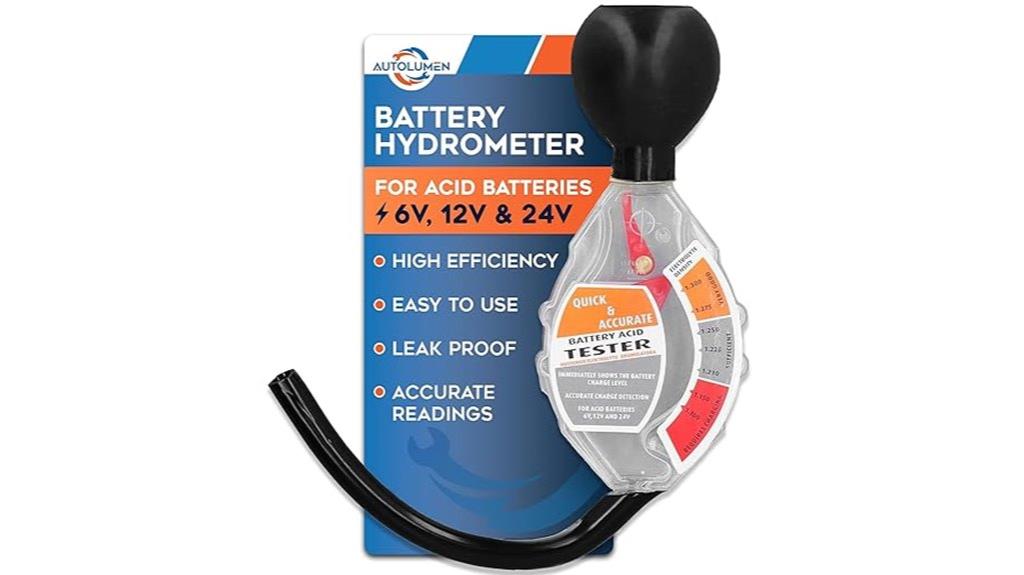
If you’re looking for a versatile battery hydrometer that works seamlessly across different vehicle types, this product stands out. It’s fully equipped with a dynamic suction mechanism and a durable plastic casing, ensuring precise readings every time. Easy to use—just remove the battery caps, insert the hydrometer, draw electrolyte, and read the scale. Compatible with 6V, 12V, and 24V batteries, it’s perfect for cars, trucks, motorcycles, and golf carts. Reliable in all climates, it helps accurately measure electrolyte gravity, preventing overcharging and extending battery life. Whether for professional or DIY use, this hydrometer makes battery maintenance straightforward and effective.
Best For: DIY enthusiasts, automotive professionals, and vehicle owners who need an accurate, versatile tool to test and maintain 6V, 12V, and 24V batteries across various vehicle types.
Pros:
- Fully equipped with a dynamic suction mechanism and durable plastic casing for precise and reliable readings.
- Easy to operate with simple steps—remove caps, insert hydrometer, draw electrolyte, and read.
- Compatible with multiple battery voltages (6V, 12V, 24V) and suitable for cars, trucks, motorcycles, and golf carts.
Cons:
- May require some familiarity with battery maintenance for optimal use.
- Limited to electrolyte gravity measurement and does not diagnose other battery issues.
- Requires manual operation and reading, which might be inconvenient for some users.
Mighty Max Battery Golf Cart/Deep Cycle Battery Hydrometer Tester
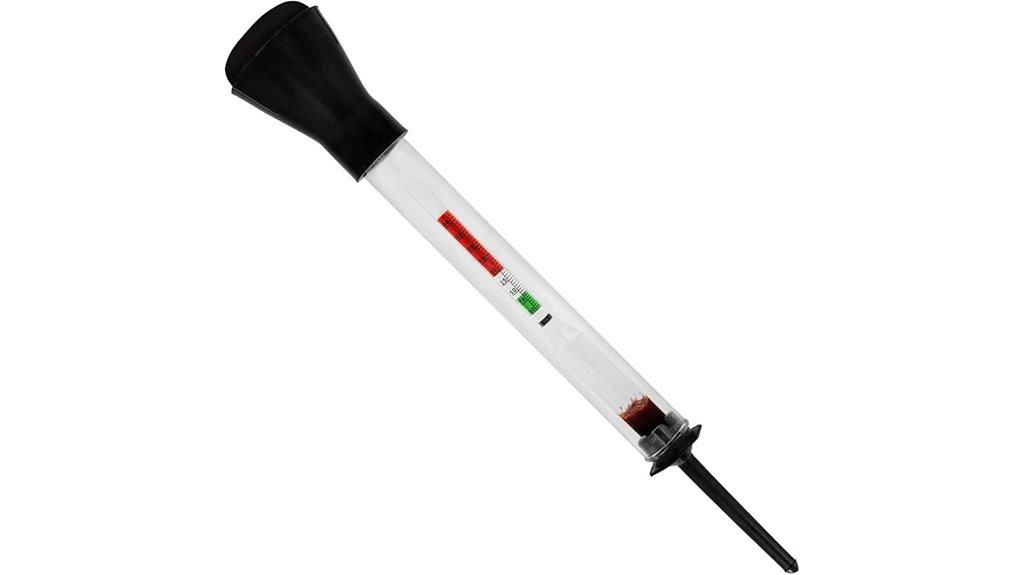
Designed specifically for professionals and DIY enthusiasts working with golf carts, forklifts, or boats, the Mighty Max Battery Hydrometer Tester offers precise measurements of battery acid’s specific gravity. This compact, handheld device is lightweight at just 2.4 ounces and easy to use, providing accurate readings of individual battery cells. It helps identify weak or failing batteries, making maintenance straightforward. Suitable for various deep cycle and golf cart batteries, it’s ideal for load testing and monitoring charge levels. With a one-year warranty and straightforward design, the Mighty Max Hydrometer is a reliable tool to prolong battery life and guarantee optimal performance.
Best For: DIY enthusiasts and professionals needing accurate battery acid specific gravity readings for golf cart, forklift, or boat batteries to ensure optimal performance and longevity.
Pros:
- Provides precise and reliable measurements of individual battery cell health
- Compact and lightweight design makes it easy to handle and use in tight spaces
- Suitable for a variety of deep cycle and specialty batteries, including golf carts and marine applications
Cons:
- May require careful handling to avoid leaks and potential acid spills
- Packaging issues reported, such as missing parts upon arrival
- Limited to testing specific gravity; does not diagnose other battery issues or perform load testing
Kingdder 2 Pack Golf Cart Battery Hydrometer
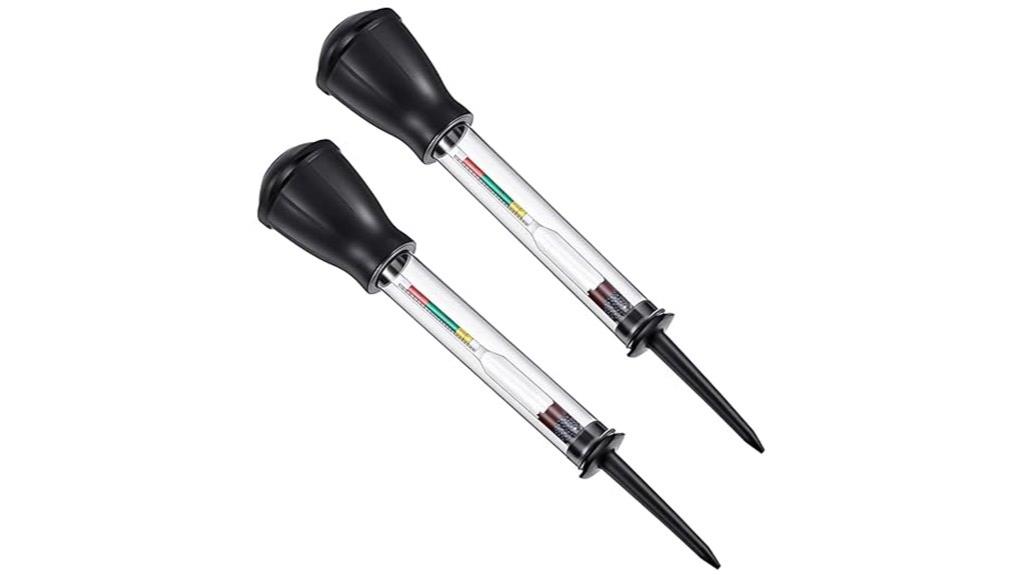
The Kingdder 2 Pack Golf Cart Battery Hydrometer stands out as an excellent choice for those managing multiple deep cycle batteries, thanks to its dual-pack design that allows for quick testing of several batteries without switching devices. With high precision—0.005 specific gravity accuracy—it eliminates the need for float readings or thermometers, making testing straightforward. Its compact, lightweight build makes it portable and perfect for on-the-go use. Crafted from durable, crack-resistant materials, it’s built to withstand frequent use. The easy-to-read display and tight seal ensure accurate results, helping you assess battery health efficiently and extend your batteries’ lifespan with minimal hassle.
Best For: individuals and professionals managing multiple deep cycle batteries such as those in golf carts, RVs, ships, or other battery-powered equipment seeking quick, accurate testing tools.
Pros:
- High precision with 0.005 specific gravity accuracy for reliable readings
- Portable and lightweight, ideal for on-the-go testing and multiple batteries
- Durable construction with crack-resistant and fall-resistant materials for long-term use
Cons:
- Manual measurement may result in slight size errors or inconsistencies
- Slight color differences in display due to monitor variations
- Requires proper sealing with a tight plug for optimal accuracy
Car Battery Hydrometer & Acid Tester

For those inspecting vehicle batteries, the Car Battery Hydrometer & Acid Tester stands out because it accurately measures electrolyte density across 6V, 12V, and 24V batteries, making it ideal for both deep cycle and standard batteries. Its double tips with color-coded scales quickly indicate electrolyte levels below 1.25, alerting you when replacement is needed. Made from transparent, durable materials, it’s built to resist deformation and cracking. Using it is straightforward: just suck up the fluid, keep the black buoy aligned, and read the density. A healthy battery shows a reading between 1.275 and 1.300, ensuring reliable performance.
Best For: Vehicle owners and mechanics who need quick, accurate testing of electrolyte levels in 6V, 12V, and 24V batteries to ensure optimal battery health.
Pros:
- Provides accurate measurement of electrolyte density, supporting battery maintenance.
- Color-coded tips quickly alert users to low electrolyte levels below 1.25.
- Made from durable, transparent materials resistant to cracking and deformation for long-lasting use.
Cons:
- Requires batteries for operation, adding to maintenance.
- May be less effective in extremely hot environments if temperature exceeds 80°C.
- Slightly larger size may be inconvenient for storage in tight spaces.
Deka Temperature Correcting Battery Hydrometer (00231)

If you need a reliable hydrometer that offers precise temperature correction, the Deka Temperature Correcting Battery Hydrometer (00231) is an excellent choice. Its glass tube design guarantees accurate measurements of battery acid specific gravity, while the built-in temperature correction gauge adjusts readings based on electrolyte temperature. The float with numerical markings makes readings straightforward, and the vacuum suction ball simplifies drawing acid into the tube. Durable and easy to clean, it’s suitable for automotive, RV, and industrial batteries. Many users praise its reliability, affordability, and ease of use, making it a go-to tool for consistent battery maintenance and troubleshooting.
Best For: DIY enthusiasts, automotive technicians, and industrial maintenance professionals seeking accurate, temperature-corrected battery acid testing.
Pros:
- Provides highly accurate and repeatable specific gravity readings.
- Features built-in temperature correction gauge for year-round precision.
- Durable glass construction and easy to clean for long-term use.
Cons:
- Glass tube can be fragile and requires careful handling.
- Proper sealing needed around the temperature gauge to prevent leaks.
- Regular rinsing is necessary to prevent corrosion from residual battery acid.
Car Battery Hydrometer, Professional Battery Tester
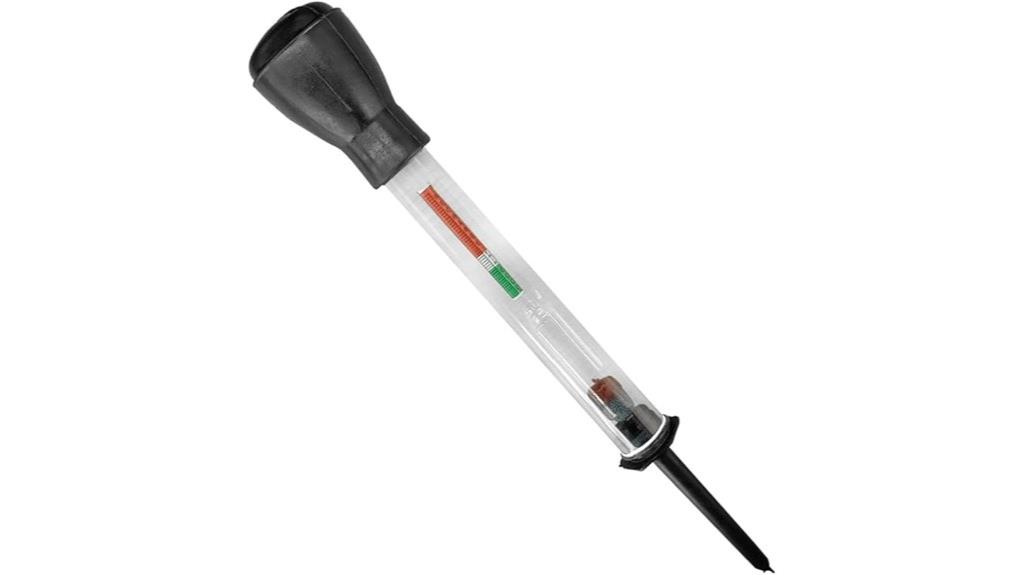
A professional car battery hydrometer is essential for those who need reliable and precise electrolyte measurements across various battery types. It offers a measurement range of 1.100-1.300 with an accuracy of 0.005, ensuring every reading is trustworthy. Its transparent design with color-coded indicators and a clear scale makes it easy to read quickly. Suitable for gel, AGM, and lead-acid batteries, it’s versatile for cars, boats, and RVs. Made from durable glass and rubber, it’s built to last. Compact and lightweight, it’s perfect for both professional technicians and DIY enthusiasts who want accurate diagnostics on the go.
Best For: DIY enthusiasts, professional mechanics, and boat or RV owners seeking precise and reliable battery electrolyte measurements on the go.
Pros:
- Provides highly accurate readings with a measurement range of 1.100-1.300 and 0.005 precision.
- Easy to read with transparent design, color-coded indicators, and a clear scale for quick measurements.
- Durable construction with high-quality glass and rubber for long-lasting use in various environments.
Cons:
- May require careful handling due to fragile glass components.
- Limited to electrolyte density measurement, not suitable for other battery diagnostics.
- Compact size might make it less comfortable for extended use compared to larger tools.
Car Battery Hydrometer Tester

The Car Battery Hydrometer Tester stands out as an essential tool for vehicle owners and technicians who want quick, accurate insights into their batteries’ health. It measures acid quality for 6V, 12V, and 24V lead-acid batteries, compatible with cars, trucks, RVs, and trailers. The tester provides precise specific gravity readings unaffected by temperature, making diagnostics straightforward. Its durable construction from high-quality PC and silicone ensures long-term reliability. With a clear scale and simple operation, it’s compact and portable, perfect for on-the-go maintenance. Using this tester helps detect overcharging, damage, and low acid levels, keeping your battery in peak condition.
Best For: vehicle owners, mechanics, and maintenance professionals seeking quick, accurate battery health diagnostics for various lead-acid batteries.
Pros:
- Provides precise specific gravity readings unaffected by temperature variations.
- Made from durable, heat-resistant, corrosion-resistant materials for long-term use.
- Compact and portable, ideal for on-the-go maintenance and quick diagnostics.
Cons:
- Requires proper alignment of the black buoy for accurate readings.
- Limited to lead-acid batteries; not suitable for lithium or other battery types.
- May need some practice for precise interpretation of the scale and readings.
Car Battery Hydrometer for Deep Cycle Electric Battery Testing

For those testing deep cycle electric batteries, the Car Battery Hydrometer stands out due to its precise measurement capabilities and durable design. It measures electrolyte density in lead-acid batteries, including automotive, marine, gel, and AGM types, helping you assess battery health and prevent internal damage. With a measurement range of 1.100 to 1.300 and 0.005 accuracy, it provides reliable, stable readings. Its transparent housing features color coding and clear markings for quick, easy use, even in low light. Made from high-quality glass and rubber, it’s built to resist corrosion and impact, making it a dependable tool for extending your battery’s lifespan.
Best For: automotive, marine, and deep cycle battery users seeking accurate electrolyte testing and battery health assessment.
Pros:
- Provides precise measurements from 1.100 to 1.300 with 0.005 accuracy for reliable results.
- Durable construction with corrosion-resistant glass and impact-resistant rubber for long-lasting use.
- Compact and lightweight, making it portable and easy to use in various environments.
Cons:
- Some users report issues with deformation or leakage over time.
- Lack of detailed instructions may pose challenges for first-time users.
- Customer reviews indicate inconsistent quality and durability across units.
Hydrometer for Vehicle Battery Testing

When testing vehicle batteries, choosing a hydrometer built from durable, high-quality materials makes all the difference in guaranteeing reliable readings over time. I recommend models made from natural, eco-friendly plastics that withstand daily use and last for years. These hydrometers are versatile, compatible with various battery types, including deep cycle batteries and acid testing. Their vibrant colors add a touch of style, and their craftsmanship ensures comfortable handling and safety. Plus, many come with a satisfaction guarantee, making them a dependable choice for vehicle maintenance. A sturdy, reliable hydrometer is essential for keeping your vehicle’s battery in top condition.
Best For: vehicle owners and maintenance professionals seeking a durable, eco-friendly hydrometer for accurate battery testing.
Pros:
- Made from high-quality, natural plastic for durability and long-lasting performance
- Versatile and compatible with various battery types, including deep cycle and acid batteries
- Stylish with vibrant color options and designed for comfortable handling and safety
Cons:
- May be slightly more expensive than basic models due to eco-friendly and premium materials
- Requires proper calibration and handling to ensure accurate readings
- Limited availability of certain color options depending on retailer
2Pcs Battery Hydrometer Set
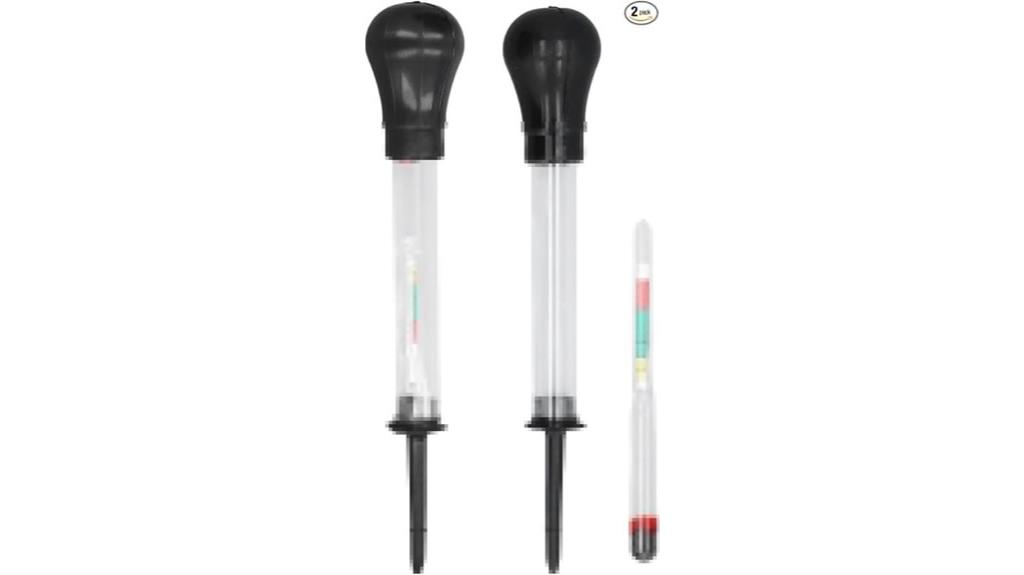
A 2-piece battery hydrometer set is perfect for anyone who needs reliable and precise measurements of electrolyte density in various batteries. It features a wide measuring range from 1.100 to 1.300 specific gravity with high accuracy of 0.005, making it suitable for automotive, marine, and recreational batteries. The clear, intuitive scale allows for quick readings, and its durable glass construction guarantees longevity. Designed to be portable and lightweight, this set is easy to carry for outdoor use. However, some users report issues like broken or missing hydrometers upon arrival, so quality control might be inconsistent. Overall, it’s a versatile tool for battery maintenance.
Best For: hobbyists, automotive enthusiasts, and marine operators needing accurate electrolyte density measurements for battery maintenance.
Pros:
- Wide measuring range (1.100 to 1.300 specific gravity) for versatile use
- High accuracy (0.005) ensures reliable readings
- Durable, high-quality glass construction for longevity
Cons:
- Some users receive broken or non-functional hydrometers due to fragile glass design
- Inconsistent quality control leading to missing or defective units
- Reports of only one functional hydrometer in the set, with the second often damaged or unavailable
Factors to Consider When Choosing a Battery Hydrometer
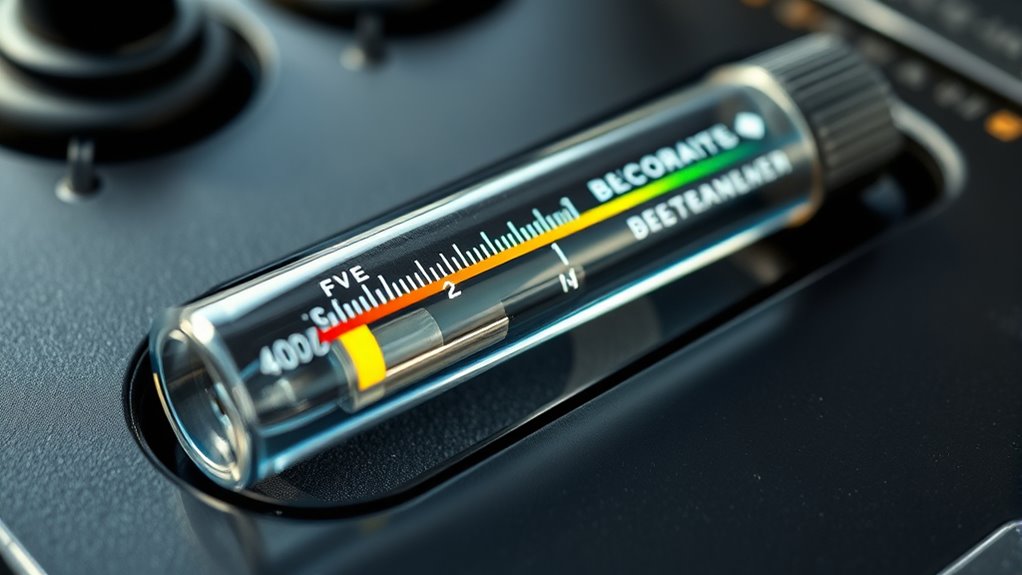
When choosing a battery hydrometer, I consider its measurement range and accuracy to guarantee reliable readings. I also look at compatibility with different battery types and how easy it is to use the device. Ultimately, features like durability, material quality, and temperature compensation play a big role in my decision.
Measurement Range Accuracy
Choosing a battery hydrometer with the right measurement range and accuracy is essential for reliable results. A wider measurement range, like 1.100 to 1.300 specific gravity, lets me test various battery types and states of charge effectively. High accuracy, around 0.005, ensures I get precise readings, helping me accurately assess battery health and avoid misdiagnosis. Consistent calibration and sturdy construction are crucial to maintain accuracy over time. Small variations in measurement precision can lead to incorrect conclusions, causing unnecessary replacements or missed issues. I prefer hydrometers with a proven track record of reliable, precise measurements, as this gives me confidence that my battery maintenance is based on dependable data. Accurate measurement range and precision are key to keeping my batteries in peak condition.
Battery Compatibility Types
Matching a battery hydrometer to your specific battery type guarantees accurate readings and prevents potential damage. Different lead-acid batteries—flooded, AGM, gel, deep cycle—each have unique requirements. Compatibility depends on the hydrometer’s measurement range, usually from 1.100 to 1.300, fitting most automotive and marine batteries. Some hydrometers are designed for 6V, 12V, or 24V systems, so selecting the right voltage match is essential. Universal models can work across multiple types, but you must verify their compatibility with your battery chemistry. Using an incompatible hydrometer can lead to inaccurate readings or even damage the device or battery. Carefully choosing a hydrometer that suits your battery’s specific design guarantees reliable diagnostics and prolongs battery life.
Ease of Use Design
A battery hydrometer that’s easy to use makes testing straightforward and accurate, even for beginners. It should feature clear instructions and simple operation, so you don’t need extensive training to get reliable readings. Ergonomic grips and minimal parts reduce user fatigue and simplify maintenance, making the testing process more comfortable. Hydrometers with transparent, color-coded scales allow you to interpret electrolyte specific gravity levels quickly, saving time and reducing mistakes. A user-friendly design also minimizes the need for extra tools like thermometers or calibration charts, streamlining the entire process. Additionally, a compact, lightweight model enhances portability, letting you perform tests conveniently in various settings. Overall, ease of use is essential for both amateurs and professionals seeking quick, accurate battery health assessments.
Durability and Material
Durability and the materials used in a battery hydrometer are essential because they determine how well the instrument withstands regular use and exposure to harsh conditions. High-quality glass or tough plastic are common choices, as they resist breakage from drops or impacts. The materials should also be resistant to corrosion and chemical degradation caused by battery acids, ensuring longevity. Thermally stable materials help maintain accurate readings across various temperatures, especially outdoors or in industrial settings. Impact-resistant components reduce the risk of damage, extending the hydrometer’s lifespan. For cold environments, low-temperature crack-resistant plastics are preferable, as they retain integrity in harsh weather. Overall, selecting a hydrometer with durable, resistant materials guarantees reliable performance over time and under demanding conditions.
Temperature Compensation Features
Temperature compensation features are vital when choosing a battery hydrometer because they guarantee accurate specific gravity readings regardless of electrolyte temperature. These features automatically adjust readings based on electrolyte temperature, ensuring reliability across different conditions. Many hydrometers include built-in temperature gauges or correction charts, making it easier to correct measurements for temperatures typically between 0°C and 50°C. Since electrolyte density varies with temperature—roughly 0.001 specific gravity per 1°C change—proper compensation prevents misdiagnosis of battery health. Using a hydrometer with this feature saves time by reducing manual calculations and reference chart use. It guarantees you get consistent, precise readings, leading to better maintenance decisions and longer-lasting batteries. Temperature compensation is essential for accurate, dependable battery testing.
Size and Portability
When choosing a battery hydrometer, size and portability are key factors that can influence how easy it is to use and store. A compact, lightweight hydrometer is much easier to carry around and maneuver in tight or hard-to-reach battery compartments. Most portable hydrometers measure between 11 to 12 inches, fitting comfortably in a toolbox or pocket. Smaller models are ideal for DIY enthusiasts and professionals who need quick, on-the-go testing without hassle. On the other hand, larger, bulkier hydrometers might offer extra features but can be cumbersome to transport and store. Picking a size that suits your specific battery setup ensures you get accurate readings without dealing with unwieldy equipment. Ultimately, the right size makes testing more convenient and efficient.
Price and Value
Price and value are important factors to contemplate once you’ve decided on the size and portability of a battery hydrometer. Prices can range from under $10 to over $30, depending on features and build quality. Higher-priced models tend to offer better accuracy, durability, and extra features like temperature correction or multiple measurement ranges, which can be vital for precise diagnostics. When evaluating value, consider the hydrometer’s measurement range, precision, and material quality, as these influence long-term reliability. While budget models work for casual DIY use, professional-grade tools deliver more consistent, accurate readings for critical applications. Investing a little more upfront can save money in the long run by preventing misdiagnoses and extending the lifespan of your batteries.
Frequently Asked Questions
How Often Should I Check My Battery’s Specific Gravity?
I recommend checking your battery’s specific gravity once a month during regular maintenance. If your batteries are heavily used or in extreme temperatures, you might want to check more frequently, maybe every two weeks. Regular checks help catch issues early and make certain your batteries stay in top shape. Just make sure to follow safety precautions and use a reliable hydrometer for accurate readings.
Can Hydrometers Measure Battery Capacity or Only Health?
Think of a hydrometer as a gentle doctor for your battery’s soul. It measures the specific gravity of the electrolyte, which reflects the battery’s health, not its capacity. While it’s great for diagnosing how well your battery is doing, it doesn’t reveal how much energy it can store or deliver. For capacity, you’d need specialized testing tools, but for health, a hydrometer is your trusty, straightforward guide.
Are Digital Hydrometers More Accurate Than Traditional Ones?
Yes, digital hydrometers are generally more accurate than traditional ones. I find that digital models provide precise readings with less chance of user error, thanks to their clear displays and consistent measurements. Traditional hydrometers rely on reading a meniscus, which can be tricky and subjective. If you want reliable, quick results, I recommend going digital—it’s worth the investment for maintaining your batteries’ health.
Do Temperature Corrections Significantly Affect Hydrometer Readings?
You might find that temperature corrections can subtly influence hydrometer readings, which often feel like tiny whispers of accuracy. While they don’t drastically change results, applying these corrections guarantees you get a clearer picture of your battery’s health. I’ve learned that paying attention to temperature can help prolong your battery’s life and performance, making those small adjustments worth the effort for peace of mind and better maintenance.
What Maintenance Is Required for a Long-Lasting Hydrometer?
To keep my hydrometer lasting, I regularly rinse it with distilled water after each use to prevent buildup. I also store it in a safe, dry place away from direct sunlight and extreme temperatures. Checking for cracks or damage periodically helps me catch issues early. Calibrating it occasionally ensures accurate readings. These simple steps keep my hydrometer reliable and extend its lifespan considerably.
Conclusion
Choosing the right battery hydrometer can truly make or break your maintenance routine. With so many options, I know it’s tempting to just pick one and hope for the best. But trust me, the right tool reveals secrets your batteries are hiding—secrets that could save you time, money, and unexpected failures. Are you ready to discover what’s really going on inside your batteries? The perfect hydrometer might just be the missing piece you’ve been searching for.



